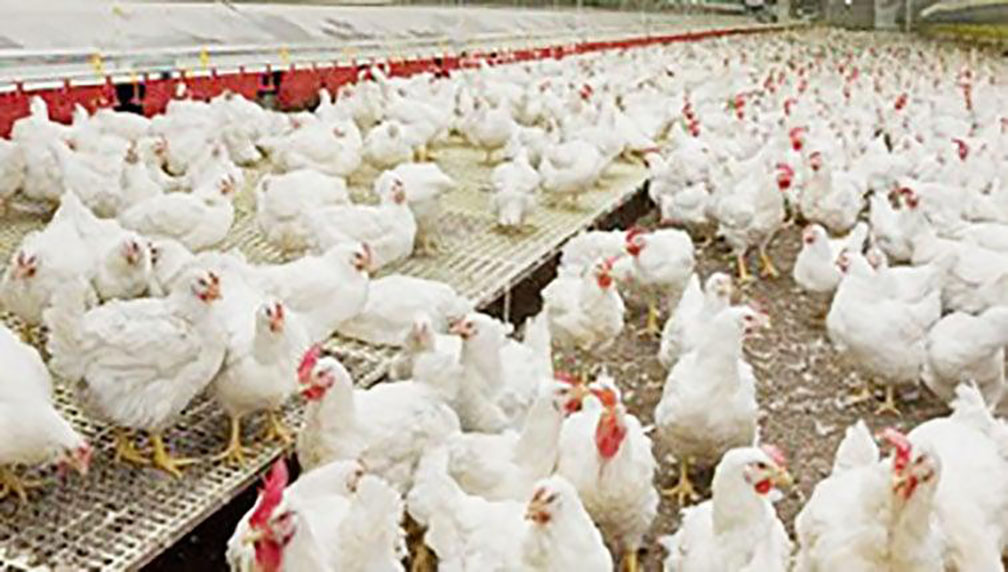The People’s National Congress Reform (PNCR) is accusing the Ministry of Agriculture of negligence in addressing the apparent poultry industry crisis.
According to a PNCR press statement, the poultry industry in Guyana is facing a severe crisis, as hundreds of farmers report substantial losses due to a suspected viral disease, Inclusion Body Hepatitis (IBH). The outbreak has led to high mortality rates among poultry, with some small and medium-sized farms experiencing total losses, the release said.
MP and Shadow Minister of Agriculture Vinceroy Jordan has condemned the government’s lack of response. He asserted that the Ministry of Agriculture has been silent on the matter, leaving poultry farmers without support or solutions. The disease, believed to be caused by fowl adenoviruses, primarily affects young broiler chickens and has reportedly mutated into a more virulent strain that poses a serious threat to the poultry sector, the release said.
Symptoms of IBH include sudden increases in mortality, listlessness, severe anemia (indicated by pale combs and wattles), and yellow mucoid droppings. The disease has been devastating to the industry, with significant economic losses anticipated due to the high death rates among affected birds.
Veterinary officers from the Guyana Livestock Development Authority (GLDA) have indicated that the disease is transmitted through infected eggs from parent flocks, compounded by inadequate vaccination. Allegations have surfaced of a flawed vaccination programme and potential issues within hatcheries, further exacerbating the crisis. Jordan has called for transparency regarding the vaccination process and the availability of promised vaccines.
The crisis has even impacted the ministry’s own Guyana School of Agriculture, where, according to Jordan, a significant number of birds have died. Despite the scale of the outbreak, the ministry has yet to provide any official statements or updates, the release said.
Jordan has demanded answers to several pressing questions:
1. Is the poultry industry in Guyana in crisis?
2. What measures is the Ministry of Agriculture taking to address the situation?
3. How is the GLDA overseeing hatchery practices, particularly regarding egg quality and vaccination?
4. What support is the government providing to affected farmers?
5. What plans are being developed to prevent future outbreaks?
6. How will poultry farmers recover from this disaster?
The opposition is also urging the ministry to disclose the results of an investigation into alleged sabotage of the ministry’s hatchery, which reportedly led to the destruction of a large number of duck eggs. Jordan and other members of the opposition are calling for transparency and urgent action to address the unfolding crisis in Guyana’s poultry sector.
Just last week, Stabroek News carried a story where Managing Director of Bounty Farms Ltd and poultry industry representative David Fernandes confirmed a shortage of chicken on the market. He acknowledged that these shortages have caused supermarket prices to rise by an average of five per cent nationwide and the shortage stems from a combination of factors including increased consumer demand, ongoing disease challenges, and disruptions in international supply chains.
“In recent times, several factors have contributed to the shortage,” he explained. “These include a rise in demand, persistent disease challenges that have been around for a while, and international issues such as logistical problems affecting surpluses from countries like Brazil and Suriname.”
The closure earlier this year of Deonarine Arjune’s enterprise, a major poultry producer in Berbice, Corentyne, underscores the evolving dynamics within the farming sector, impacting local production. “The industry has undergone changes that have deeply affected us, resulting in the loss of valuable farmers,” lamented Fernandes.
Regarding the price increases, he clarified that they averaged around five per cent, driven by the shortage and compounded by rising freight costs and wages. Interestingly, he noted that fast-food prices have increased more significantly than chicken prices, highlighting a notable market trend.
Addressing recent disease outbreaks, Fernandes acknowledged challenges such as avian influenza and Newcastle disease, exacerbated by global warming. “Biosecurity measures are crucial,” he emphasized, stressing the need for strict adherence to guidelines to protect poultry health.
In late July, the world’s top chicken exporter from which Guyana imports chicken, Brazil, voluntarily halted poultry exports to some countries after a case of Newcastle disease was detected in the state of Rio Grande do Sul, its agriculture ministry said.
The move came as local authorities tried to contain the viral disease after around 7,000 birds died on a chicken farm in Brazil’s southernmost state. The flock’s remaining 7,000 birds were culled to comply with health protocols, according to meat lobby group ABPA. The temporary export restrictions could affect 50,000 to 60,000 metric tonnes of Brazilian poultry exports “in the worst-case scenario,” ABPA said. Brazil produces 1.2 million tonnes and exports 430,000 tonnes of poultry products, on average, per month.





